Ed Slater: Former Gloucester lock 'takes each day as it comes' after MND diagnosis
- Published
Former Gloucester lock Ed Slater speaks to BBC Breakfast about his MND diagnosis
When Gloucester lock Ed Slater started feeling muscle twitches in his arm 11 months ago he did not think a great deal of it until it continued happening 24/7.
Slater, 34, had felt twitches like these before and his strength had initially not been affected, so it was two or three months before he told anyone.
"I didn't want to face up to the fact that something could be wrong at that point, until I started to lose strength in my arm and my hand," Slater told BBC Breakfast's Sally Nugent.
At the end of July, he announced he had been diagnosed with motor neurone disease (MND) and confirmed his retirement from rugby union with immediate effect.
The second-rower joined the Cherry and Whites from Leicester in 2017 and was still playing when the twitches began, going on to make the last of his 78 appearances for the club in January.
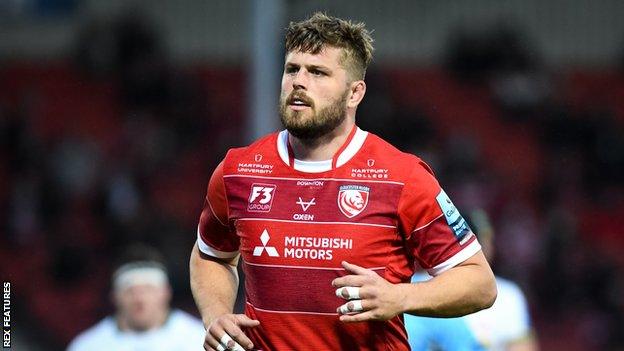
Ed Slater's last match for Gloucester came in January this year
With the symptoms worsening, Slater saw a neurologist at the start of the year. Doctors did tests and scans, looking for potential injuries that may have been caused by rugby, but found nothing.
"It was month after month, my arm got weaker and weaker, my grip became weaker and I went to Oxford and was diagnosed with MND," Slater said.
"Part of me had prepared for that, partly because of the weakness and partly because of the symptoms.
"I know very close friends of mine who have lost a family member to it, was able to speak to them about his experiences and so I prepared myself.
"I'm not saying that makes it easier when you're diagnosed - it absolutely doesn't - but in some ways it had been 11 months of torment, different symptoms, not knowing, looking for different reasons, and to have definitive diagnosis - it sounds strange to say this - but at least it gave me an answer.
"Not an answer I wanted but I can't change it. My attitude is to get on with things. There are difficult things in life, not many things harder than that, but you have to face challenges head on.
"I don't think too far into the future and I take each day as it comes. I find that's a peaceful place for me and keeps me in best spirits as I can."
Facing a new reality
MND is a degenerative condition that affects nerves in the brain and spinal cord. Slater is not the only sports person to have been given the diagnosis in recent years.
Former rugby league player Rob Burrow, ex-Scotland rugby union lock Doddie Weir and former footballers Stephen Darby and Len Johnrose all have MND and have campaigned to raise awareness of the disease.
While Slater had been "preparing for the worst", he said it was very difficult for his wife, Jo, to hear when doctors delivered the news.
"When they started talking about the realities of it we swapped roles and my wife went, 'here is what I can do to help', whereas actually that's where I found it really tough and most emotional to be honest," he said.
"Rather than getting the news, speaking to someone about the realities of the disease you have, that was really difficult."
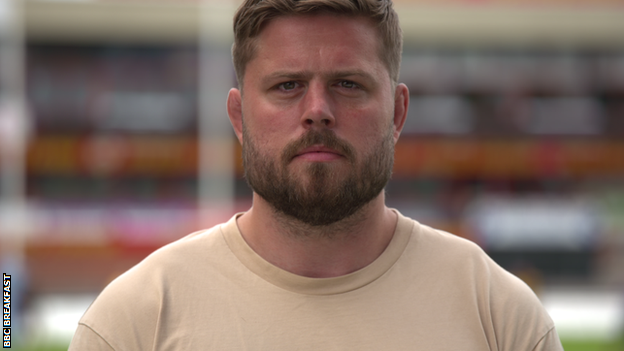
Gloucester lock Ed Slater was diagnosed with MND this year after months of unexplained symptoms
The couple were given advice on everything from how to adapt their house, how the disease will develop, how to apply for a blue disability badge and how to deliver the news to friends and family.
Slater has already taken steps - as former Burnley and Blackburn midfielder Johnrose has - to record his voice, with MND known to affect speech.
"It was almost like in that moment a line had been drawn which I hadn't prepared for," said Slater.
"Suddenly time had sped up and that was the difficult bit, but in some ways it gives me a focus how I can help the family, create as little work as possible for them as things change."
Telling the couple's young children - two girls and a boy - was equally hard.
"We wanted them to have as much information as they could handle without keeping anything away and that meant talking about the realities of the disease," said Slater.
"I didn't want them to have half the picture and pick up on lots of changes going on around the house and in life.
"They are young so we adapted it, but they are amazingly resilient, and, in that moment, they may have found it difficult but once they realised nothing was changing immediately, they got on with things.
"They're beautiful kids and they handled it really well. They come out with funny one-liners and put a smile on your face. Just to be around them is a great source of comfort."
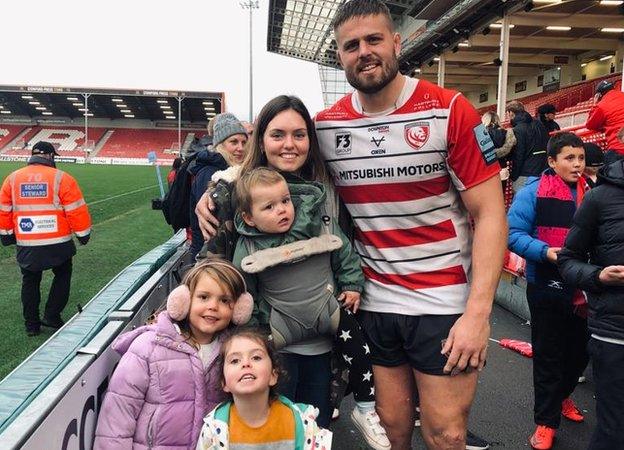
Ed, wife Jo and family
Taking each day as it comes
Slater spent time with Eastern Suburbs in Sydney, Australia, and Nottingham, in the English Championship, early in his rugby union career before moving to Leicester in 2010.
He enjoyed a hugely successful seven-year spell with the Tigers, winning the 2012-13 Premiership title and was made captain. He also skippered England Saxons in 2014 before joining Gloucester.
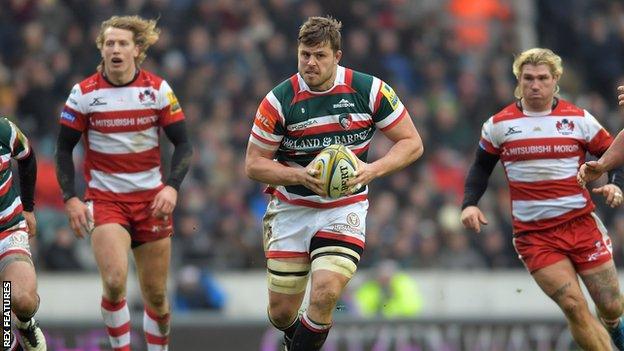
Slater spent seven years with Leicester Tigers and won the Premiership title with the team
Pre-diagnosis, Slater was already at a point in his career where he was thinking about a future move into coaching and Gloucester have opened the door to him working with their academy. Staying active for as long as he can is important.
"I feel like I'm fighting against something that is progressing," he said. "But I've got to be conscious not to be waking up each day looking for something to be worse.
"I've got to take each day as it comes but there are signs. When I spoke to the players here [at Gloucester] I said I need normality. I won't shy away from it but at the end of the day I'm a normal person."
Slater now wants to add his own voice to the conversation about MND that Burrow, Weir and Darby have started.
On Monday, Slater and a group of his former and current team-mates - including Fraser Balmain, Lewis Ludlow and Billy Twelvetrees - begin a 350-mile cycle from Kingsholm Stadium to raise awareness and money for the 4Ed campaign, set up to generate funds for his treatment and to support his family.
"The club have rallied round and others have joined to facilitate the bike ride," Slater added.
"It's a huge challenge, I haven't done any training, I'm relying on others who haven't either. I wanted to physically and mentally challenge myself, and sometimes I don't think there is anything better than being around people you love being around and doing something that's really challenging, and at the same time raising the profile of motor neurone disease.
"I'm very aware there's lots of people around the country living with this disease that don't get the support I've got."

'Ed doesn't want to be treated differently'
BBC Breakfast's Sally Nugent
When I meet Ed for the first time I am struck by two things: his height (6ft 6in) and his ability to make everyone else around him feel relaxed.
We talked about rugby, about journalism and the work our team on BBC Breakfast have done with other sportsmen with motor neurone disease.
He has watched it all over the last few months, quietly suspecting he was on the same path as Rob Burrow, Doddie Weir and Stephen Darby.
Initially he didn't want to tell anyone about the twitches in his arm and weakness on his left side. But eventually he did and that led to a diagnosis of MND at the John Radcliffe Hospital, not too far away from where we are today.
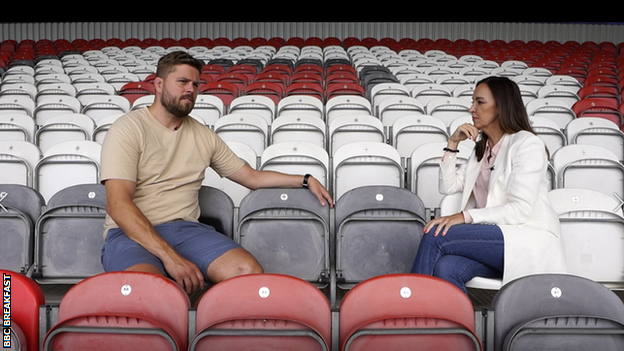
Ed Slater told his story to BBC Breakfast's Sally Nugent
I can't see any obvious sign of the disease that we are so familiar with now but Ed says he already feels like he's fighting something.
He's a family man and glows when he talks about his children: two girls and a boy. As we sit in the stands at Gloucester, his team are training below us. They stop for nothing, don't treat him any differently - something that is important to him.
With that in mind, he will set off on a cycle ride this week to raise money and awareness for MND. He hasn't trained for it and they will be cycling on borrowed bikes, but he says his friends and team-mates will get him through it
